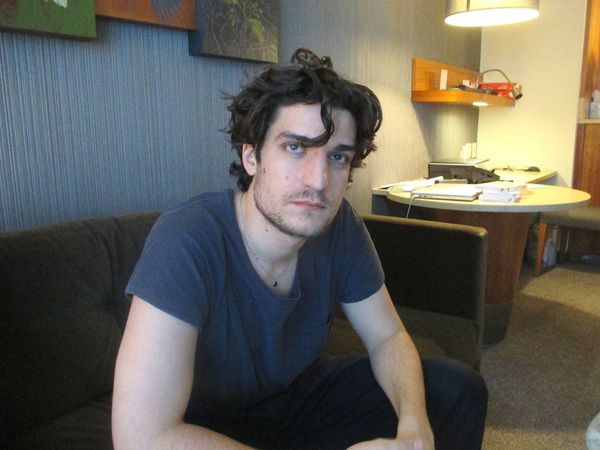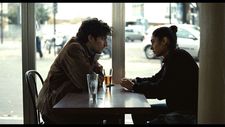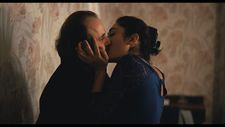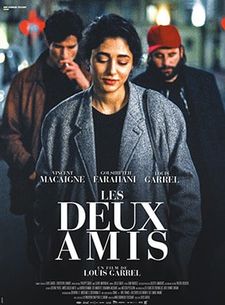 |
| Louis Garrel on Paul Thomas Anderson, Eric Rohmer, Jacques Demy and Federico Fellini, I Vitelloni moments Photo: Anne-Katrin Titze |
Arnaud Desplechin, César Best Director for My Golden Days and Cannes jury member along with Valeria Golino, Donald Sutherland, Katayoon Shahabi, Mads Mikkelsen, Kirsten Dunst, Vanessa Paradis, László Nemes, headed by George Miller, has announced that Mathieu Amalric, Charlotte Gainsbourg, Marion Cotillard and Louis Garrel will star in his next film, Les Fantomes D’Ismaël.
 |
| Mona (Golshifteh Farahani) with Abel (Louis Garrel) and Clément (Vincent Macaigne) |
Garrel's Two Friends (Les Deux Amis), written with Métamorphoses director Christophe Honoré, stars Golshifteh Farahani (of Asghar Farhadi's About Elly), Vincent Macaigne (Mia Hansen-Løve's Eden) and Garrel. The director is also featured in Maïwenn's My King (Mon Roi) with Emmanuelle Bercot, Isild Le Besco and Vincent Cassel.
Both films had their World Premieres at last year's Cannes Film Festival and screened at this year's Rendez-Vous with French Cinema in New York.
My King works in waves. We are pulled under and spat out to reflect for ourselves about the human heartbreak we witness. Two parallel strands of storytelling emerge - one forward showing Tony's (Emmanuelle Bercot) painful progress at a seaside physical therapy facility after a skiing accident that results in a ligament tear, and one backwards, recounting her eventful life together with Georgio (Vincent Cassel) who warns "I'm not a jerk, I'm the king of jerks." Babeth (Isild Le Besco) and Tony's brother Solal (Garrel) know that what they see is too good to be true.
 |
| My King director Maïwenn Photo: Anne-Katrin Titze |
Louis Garrel's directorial debut feature Two Friends begins with a woman taking a shower. The shower is behind bars, and Mona (Golshifteh Farahani) has to return to her cell every night after her shift at a café kiosk in the Gare du Nord. Clément (Vincent Macaigne) is one of her customers and convinced that he loves her although he knows nothing about her. His best and only and maybe not much longer friend Abel (Garrel himself) falls back on his own vast immaturity in relationships.
Anne-Katrin Titze: Christophe Honoré sent me an e-mail, asking if I was going to talk to you while you're in New York.
Louis Garrel: Oh yes? You met him when he came here?
AKT: We did two big features with him, the last one on myths. About his last two films. Let's start with him. There were a few, I felt, Honoré moments in Two Friends. I am thinking of the dance.
LG: Curiously, no, the dance was my desire.
AKT: It felt connected to other moments and going back to Audrey Hepburn in Funny Face.
 |
| Abel with Mona |
LG: Ah, yes. There are so many moments in cinema where the girl is dancing. People say it's like an obligatory imposed moment. I feel like saying, it's a moment requested or demanded by the viewer. I had a stupid little theory that from time to time American cinema unconsciously was in rivalry with Broadway whereas French cinema was unconsciously competing with French theatre.
That's why for instance when you see a Paul Thomas Anderson film, you see a ballet plus an opera, plus, plus, whereas when you watch an Eric Rohmer film you have the feeling that you are going to the Théâtre de la Colline or the Théâtre de l'Odéon - which are high quality public French theaters. I felt like doing this little scene as a kind of citation of what we like once in a while to have in French cinema. That once in a while it could also be like a musical comedy.
AKT: There was another moment when I was wondering if you would go into a musical number. At the gas station when you are talking to the blond woman in the car. For your character, it's an Umbrellas Of Cherbourg moment and for her it's a who is this jerk moment.
 |
| Abel with Clément and Mona |
LG: I think it's more like a Vitelloni moment, you know. This kind of character who is thirty years old and has nothing. They are trying to be someone else but they are too lazy, too immature to become somebody. The kind of tenderness that that character makes us feel. Esthetically, there is a descendence from Jacques Demy but I think what I'm quoting are these Italian films that are able to describe very immature characters with a lot of tenderness.
AKT: Golshifteh Farahani is a great actress. I loved her in Asghar Farhadi's About Elly. Is that where you first saw her? How did you cast her?
LG: I made a short film that I shot in like three days with nothing. I asked Clotilde Hesme, who is a French actress, but she couldn't play in it. And I needed an actress. So we were searching with Vincent Macaigne on the Web. And then suddenly he said to me "I think that actress is Iranian." And because Vincent Macaigne is half-Iranian, he told me, "Oh it would be good to meet her." This is how I met her the first time.
 |
| Abel endorses Clément and Mona |
AKT: The scene I was most engaged in was the one at the train station. When the two guys pull her off the train. What a violent thing!
LG: Some feminists hate that scene. I read that on the internet. How can two stupid guys like this be two characters? They are horrible with the woman, how can you be attracted by these men? Christophe wrote that scene and he wrote it like in a comic way. Finally, I did an interpretation as a director as more dramatic. Vincent did a comic interpretation and Goshifteh did a dramatic interpretation.
All that mix makes that scene very strange and that's why I think it's an interesting scene. It's coming from different points of view. Sometimes it's comic, sometimes it's dramatic. You never know exactly what she is mad about.
AKT: For the guys it's a comic scene and we in the audience know that it's almost life or death for her.
 |
| Clément and Mona |
Louis received some advice from Vincent Cassel on his character in My King.
LG: Vincent Cassel, when we started to shoot, told me "Okay, Louis, we have to be aware that it's a movie made by a woman. Also we have to make a movie not against men." What Cassel is thinking, if I'm correct, I have to do a scene where I'm not only a bastard. She thinks I'm a bastard but I'm going to show her that actually, I'm the king of the bastards. As you would say in mathematics, minus times minus equals plus.
AKT: When did you enter the picture, My King?
LG: Maïwenn told me about wanting to make a destructive love story. Because I knew her a little bit I knew that she would do it very well. Then she told me about the character of the brother. Then I read the script and then we didn't do it. She wrote lines that she doesn't want … She shot for 25 minutes my improvisations and finally any lines from the script are not in the movie.
 |
| Les Deux Amis poster |
And I felt that this young brother could be an emotional character because in that war she has to lead, this combat that she has to carry out in her life, I felt in the film that a very pacifying character would be very welcome. The story is about a man and a woman. It's all about strategy and trying to understand what is true, what is not true. From the man, is it a perversion game or is it a true game?
Does he know himself that he is doing something very painful for the female character? You can also see the movie as a film about strategy - to discover what is real and what isn't real. When you have this kind of situation in your own life, you need someone close to you who is very clear.
AKT: Who can't really help, though?
LG: Exactly. You can't really help but you have to be there.
My King opens in the UK on May 27 and in the US on July 15.





















